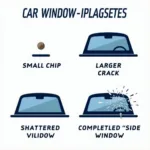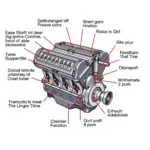Car mechanics diagnostic tests are essential for maintaining and repairing modern vehicles. These tests help identify the root cause of automotive problems quickly and efficiently, saving you time and money in the long run. From understanding basic trouble codes to utilizing advanced diagnostic software, this guide will equip you with the knowledge to navigate the world of car diagnostics.
Understanding the Importance of Car Mechanics Diagnostic Tests
Diagnostic tests have revolutionized the automotive repair industry. In the past, mechanics relied heavily on experience and intuition to diagnose car problems. This often involved a lengthy trial-and-error process, which could be both time-consuming and expensive. Today, thanks to car diagnostic plug in tool, mechanics can pinpoint issues with incredible accuracy. This not only speeds up the repair process but also ensures that the correct repairs are made the first time. These tests are crucial for both professionals and car owners who want to gain a deeper understanding of their vehicle’s health. Diagnostic tests can reveal hidden problems that might not be apparent through visual inspection.
Whether you’re experiencing engine trouble, brake issues, or electrical malfunctions, a diagnostic test can provide the necessary information to identify the source of the problem. For example, a simple check engine light can indicate a wide range of issues, from a loose gas cap to a serious engine malfunction. A car mechanics diagnostic test can quickly narrow down the possibilities and prevent unnecessary repairs.
Types of Car Mechanics Diagnostic Tests
Several types of diagnostic tests can be performed on a vehicle, each designed to assess different systems. Some of the most common include:
-
OBD-II Scan: This is the most basic type of diagnostic test and utilizes the On-Board Diagnostics II port found in most vehicles manufactured after 1996. An OBD-II scanner can retrieve diagnostic trouble codes (DTCs) stored in the vehicle’s computer, providing clues about potential problems. You can learn more about this in our article on how to use car diagnostic machine.
-
Visual Inspection: While not a technological test, a visual inspection is an essential part of the diagnostic process. A trained mechanic can often identify potential issues by visually examining the vehicle for signs of wear and tear, leaks, or other abnormalities.
-
Pressure Tests: These tests are used to check the pressure in various systems, such as the cooling system, fuel system, and braking system. Low or high pressure can indicate a leak, blockage, or other malfunction.
-
Component Tests: These tests are used to assess the performance of individual components, such as sensors, actuators, and modules. This can involve using specialized tools like multimeters, oscilloscopes, and icarsoft professional car diagnostic tool cr pro.
How to Interpret Diagnostic Trouble Codes (DTCs)
DTCs are alphanumeric codes that correspond to specific problems within the vehicle’s systems. Understanding these codes is crucial for effective diagnosis and repair. You can find information on DTCs online or in repair manuals. Many diagnostic tools, even the china car diagnostic tools, provide descriptions of DTCs along with their meanings. While DTCs offer valuable information, it’s important to remember that they don’t always provide a definitive diagnosis. They should be considered as clues rather than absolute answers. Further investigation is often necessary to pinpoint the exact cause of the problem.
What is a Car Diagnostic Test?
A car diagnostic test is a process used to identify problems within a vehicle’s various systems.
How long does a Car Diagnostic Test take?
A basic OBD-II scan can take as little as a few minutes. More complex diagnostic procedures can take several hours.
The Future of Car Mechanics Diagnostic Tests
The field of car diagnostics is constantly evolving. With advances in diagnostics for cars software, diagnostic tools are becoming increasingly sophisticated, offering more detailed information and greater accuracy. Emerging technologies such as artificial intelligence and machine learning are also being integrated into diagnostic tools, enabling more predictive and proactive maintenance.
Conclusion
Car mechanics diagnostic tests are a critical part of modern vehicle maintenance and repair. Understanding how these tests work and how to interpret the results can empower car owners and mechanics alike to make informed decisions about their vehicles. By embracing the power of diagnostic technology, we can ensure that our vehicles remain safe, reliable, and perform at their best.
FAQs
-
What is the cost of a car diagnostic test? The cost can vary depending on the complexity of the test and the location.
-
Can I perform a diagnostic test myself? Yes, with a basic OBD-II scanner.
-
Are diagnostic tests always accurate? While generally accurate, further investigation might be needed.
-
What is the OBD-II port? It’s the standardized port used to access the vehicle’s computer.
-
How often should I get a diagnostic test? It’s recommended to have it checked annually or when experiencing car trouble.
-
What is a diagnostic trouble code (DTC)? A DTC is a code that indicates a specific problem area within a vehicle’s systems.
-
How can I find more information about specific DTCs? Online resources and repair manuals provide detailed information about DTC meanings.
Common Diagnostic Test Scenarios
-
Check Engine Light: This is the most common reason for a diagnostic test.
-
Transmission Problems: Slipping gears or rough shifting can indicate transmission issues.
-
Brake Issues: Unusual noises or reduced braking performance requires immediate attention.
-
Electrical Malfunctions: Problems with lights, windows, or other electrical components can be diagnosed.
-
Performance Issues: Reduced fuel efficiency or decreased power can be diagnosed.
Further Reading and Related Articles
Explore our website for more information on car maintenance and repair topics.
Need help? Contact us on WhatsApp: +1(641)206-8880, Email: [email protected]. We offer 24/7 customer support.


